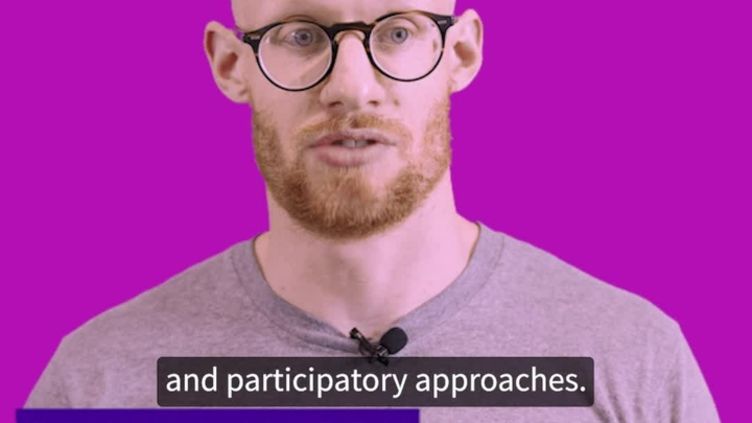Dr Will Mason
Sheffield Methods Institute
Senior Lecturer in Applied Social Sciences


+44 114 222 8368
Full contact details
Sheffield Methods Institute
The Wave
2 Whitham Road
Sheffield
S10 2AH
- Profile
-
Dr Will Mason is a sociologist with expertise in youth and community work, child welfare inequalities, critical methodologies and community-based participatory approaches. He is currently a Lecturer in Applied Social Science at the Sheffield Methods Institute, University of Sheffield. Will is also programme director of the ESRC accredited MA Social Research.
Will has worked on research projects ranging from national £500,000+ multi‑institution studies, to small community-based projects that deliver bespoke and localised initiatives. His research topics include child welfare inequalities, youth services, poverty, criminalisation and social harm.
Will specialises in engaged scholarship and community-led university partnerships. He plays an active role in a number of local and regional community initiatives. Will has been a volunteer youth worker for over 10 years. In this role he has supported the coordination and delivery of five open access youth services, including homework clubs, youth clubs and community gyms.
- Research interests
-
Will's research interests include:
- Youth work
- Social work
- Consumption
- Families
- Identities
- Inequalities
- Qualitative research methods
- Qualitative research ethics
- University-community partnership
- Publications
-
Journal articles
- Academic reading as a grudging act: how do Higher Education students experience academic reading and what can educators do about it?. Higher Education.


- CiviAct: Negotiating ‘fields of paradox’ in anti-racist university community partnerships. Methodological Innovations.


- Book Review: The politics and ethics of representation in qualitative research: Addressing moments of discomfort. Qualitative Research, 146879412210822-146879412210822.


- On staying: Extended temporalities, relationships and practices in community engaged scholarship. Qualitative Research.


- Understanding out of Home Care Rates in Northern Ireland: A Thematic Analysis of Mixed Methods Case Studies. The British Journal of Social Work, 51(7), 2645-2664.


- Safeguarding children when fabricated or induced illness is suspected or proven: reviewing the experiences of local safeguarding children boards in England. Child Abuse Review, 29(6), 559-573. View this article in WRRO


- Toward Full Integration of Quantitative and Qualitative Methods in Case Study Research: Insights From Investigating Child Welfare Inequalities. Journal of Mixed Methods Research, 14(2), 164-183.


- ‘No One Learned’: Interpreting a Drugs Crackdown Operation and its Consequences Through The ‘Lens’ of Social Harm. British Journal of Criminology, 60(2), 382-402.


- Poverty, inequality, child abuse and neglect: changing the conversation across the UK in child protection?. Children and Youth Services Review, 97, 127-133. View this article in WRRO


- “Swagger”: urban youth culture, consumption and social positioning. Sociology, 52(6), 1117-1133. View this article in WRRO


- Walking the Walk: changing familial forms, government policy and social work practice. Social Policy and Society, 17(4), 603-618. View this article in WRRO


- Introduction: Families, Social Work and the Welfare State: Where Contemporary ‘Family’ Meets Policy and Practice. Social Policy and Society, 17(4), 599-602.


- Some Useful Sources. Social Policy and Society, 17(4), 679-681.


- The association between child maltreatment and adult poverty: a systematic review of longitudinal research. Child Abuse & Neglect, 77, 121-133. View this article in WRRO


- Using the Framework Method to Analyze Mixed-Methods Case Studies. SAGE Research Methods Cases, Part 2. View this article in WRRO


- Poverty child abuse and neglect patterns of cost and spending. Families, Relationships and Societies, 5(1), 155-161. View this article in WRRO


- Austerity youth policy: exploring the distinctions between youth work in principle and youth work in practice. Youth and Policy, 114, 55-74. View this article in WRRO


- Social work, poverty, and child welfare interventions
. Child and Family Social Work. View this article in WRRO


Chapters
- Structural Inequalities, Neighbourhoods and Protecting Children, Child Maltreatment (pp. 81-99). Springer International Publishing


- Radically slow? Reflections on time, temporality and pace in engaged scholarship In Clift B, Gore J, Gustafsson S, Bekker S, Costas Batlle I & Hatchard J (Ed.), Temporality in Qualitative Inquiry: Theories, Methods and Practices (pp. 142-157). Routledge


Reports
- Youth violence, masculinity and mental health: learning from the communities most affected


- The relationship between poverty, child abuse and neglect: a rapid evidence review View this article in WRRO


- ‘You Don’t Come to Maple or You Get Bullets in Your Head’: Somali Youth, Risk Talk and the Realities of Risk Avoidance View this article in WRRO


Website content
- #unitydoc : participatory filmmaking as counter-storytelling. Retrieved from https://www.youthandpolicy.org/articles/unitydoc/ View this article in WRRO


- Reframing child welfare inequalities: making sense with research and changing the conversation. Retrieved from https://archive.discoversociety.org/2017/06/06/reframing-child-welfare-inequalities-making-sense-with-research-and-changing-the-conversation/ View this article in WRRO


- If you want students to read more, consider asking them to read less.


- Reading Sociological Theory. Retrieved from http://dx.doi.org/10.51428/tsr.ahgo9029


- Police drugs crackdown operations can do more harm than good – I’ve seen it. Retrieved from https://theconversation.com/police-drugs-crackdown-operations-can-do-more-harm-than-good-ive-seen-it-121515 View this article in WRRO


- Knife crime : folk devils and moral panics?. Retrieved from https://www.crimeandjustice.org.uk/resources/knife-crime-folk-devils-and-moral-panics View this article in WRRO


- ‘Reproducing the Stereotypes’: Family Complexity, Resource Scarcity and Social Work Decision-Making..


- “No one walks out their house without a knife”: living with violence as a daily threat. Retrieved from https://discoversociety.org/2018/06/05/on-the-frontline-no-one-walks-out-their-house-without-a-knife-living-with-violence-as-a-daily-threat/ View this article in WRRO


- Why those most needing child protection might be least likely to get it.


- A critical case for participant action research in youth work. Retrieved from https://www.ymca.ac.uk/wp-content/uploads/2016/11/yresarch-journal-2015-edition-1-ebook-1.pdf View this article in WRRO


Dictionary/encyclopaedia entries
- Hermeneutics. In SAGE Research Methods Foundations (Vol 1).


- Academic reading as a grudging act: how do Higher Education students experience academic reading and what can educators do about it?. Higher Education.
- Teaching interests
-
Will is the Director of the MA Social Research at the Sheffield Methods Institute. He is a Senior Fellow of the Higher Education Academy. In 2021, he was awarded Masters Teacher of the Year in the national FindAMasters.com and FindAPhD.com Postgraduate Awards.
Will has experience of teaching across a wide range of substantive and research methods courses. He currently convenes modules on the principles of research design, advanced qualitative methods and interdisciplinarity.
Will’s teaching philosophy is closely informed by both critical pedagogy and an ethic of care. This emphasises (i) the value of extending and enriching knowledge in dialogue and (ii) doing so in ways that promote mutual understanding and growth. Will is committed to the enhancement of enjoyment in and through his teaching. His educational practice seeks to maximise enjoyment by (i) creating inclusive learning environments (ii) actively seeking and responding to student feedback and (iii) creating opportunities for students to practice their craft, in experiential learning encounters.
- PhD Supervision

